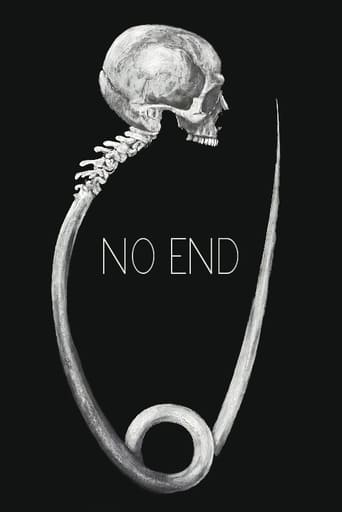TheLittleSongbird
What has been seen of Krzysztof Kieslowski (almost all his films and 'Dekalog' in its entirety) all ranges between very good (the 8th episode of 'Dekalog') to masterpiece ('Three Colors: Red' and 'Blue' and the whole 'Dekalog' series). To me, he was an immensely gifted director, who died far too early.'No End' is not one of Kieslowski's best, but like 'Camera Buff' it is another early film of his that deserves more love and attention. It may be alienating and strange to some viewers (its, as reasoned, pro-solidarity sentiments must have been reason enough for it to not be released internationally for over a year) and his more international work is somewhat more accessible. However, while some of the political story could have had more clarity in places, 'No End' is great in many ways with all the typical Kieslowski strengths that make his films so good.As was always the case in Kieslowski's work, 'No End' is made exceptionally. As well as being beautifully shot with atmospheric use of colour to match the mood, it is gritty yet beautiful with many thoughtful and emotionally powerful images and little things lingering long into the memory. Kieslowski's direction is quietly unobtrusive, intelligently paced and never too heavy. The music is suitably intricate.It's a thought-provoking film in writing, as ever thematically rich and with complex characters, and resists the trap of rambling. The 3-part story is intriguingly told, and while the political story could have done with more clarity the emotional story is harrowing and affecting and the metaphysical story fascinating. 'No End' is always engaging and suitably challenging. The acting is as always from Kieslowski marvellously nuanced and natural, especially from heart-wrenching Grazyna Szapolowska.Summing up, not among the best work of Kieslowski but deserves more love as a result of being overshadowed by his later stuff from 'Dekalog' onward. 9/10 Bethany Cox
Sindre Kaspersen
Polish screenwriter and director Krzysztof Kieslowski's fifth feature film which he co-wrote with his long-time collaborator Krzysztof Piesiewicz, their first collaboration, is a Polish production which was produced by Ryszard Chutkowski who worked as a producer on several of Krzysztof Kieslowski's films. It tells the story about Urszula, a Polish translator who lives with her son in Poland during the early 1980s when the regime had declared martial law and did everything in their power to repress and destroy the first non-communist party "Solidarity". Urszula has recently lost her husband Antek who was a lawyer and is struggling to work out her grief while trying to raise and take care of her young son by herself. When contacted by her late husband's former client Darek Stach who is still concerned about his case, she tries her best to help him, but Urszula still longs for her deceased husband and no matter what she does he is constantly on her mind.Krzysztof Kieslowski's last politically prominent film from 1985 where he began to move his focus away from the political war that had marked his native country for the last two years, merges social realism with spirituality and draws a finely tuned portrayal of a grief-stricken woman possessed by her departed husband's spirit. This subtly paced and character-driven fictional tale which examines themes such as loss, grief, interpersonal relations, family relations and love, is as much of a heartbreakingly romantic and affectingly atmospheric love-story as a political and ethical drama.Acutely and precisely directed, this visually remarkable film is notable for it's naturalistic milieu depictions, the stellar cinematography by Polish cinematographer Jacek Petrycki, the ardent production design by Alan Starski and the poignant score by one of Krzysztof Kieslowski's most regular collaborators Zbigniew Preisner, who he worked with for the first time on this film. A profoundly well-written, intimate and internal mystery with a moving and understated acting performance by Polish actress Grazyna Szapolowska in an emotionally complicated role.
writers_reign
This is an excellent film and a great discovery. It's from about ten years before The Double Life Of Veronica and the Three Colours trilogy and is, it its way, equally good. It almost certainly inspired Truly, Madly, Deeply because the main story is about a young lawyer, Antek Zyro (Jerzy Radziwilowicz) who tells us at the outset that he is dead and spends the remainder of the film watching over his widow and young son. Grazyna Szpapolowska is outstanding, not to say beautiful, as the widow who 'feels' her husband everywhere and tries a variety of remedies - hypnosis, casual sex - to dispel his presence all to no avail. It's a stunning film shot in muted blue tones throughout and well worth a visit. 9/10
adam zerda
Although there is the obvious plot of the grieving wife, the movie is really about Poland under martial law. Probably unable to directly focus on such political topics, Kieslowski attempts to 'hide' this other side beneath a twisted Ghost subplot.A dark movie, one that demands attentive viewing, this one will probably never be as successful as some of Kieslowski's other works, which have probably led its viewers to pick up this one.



